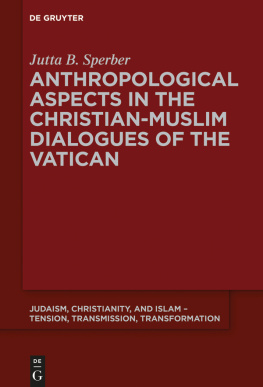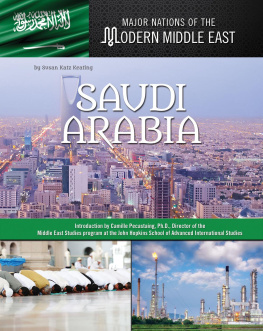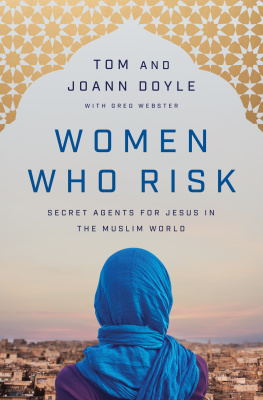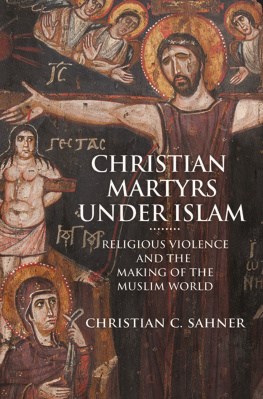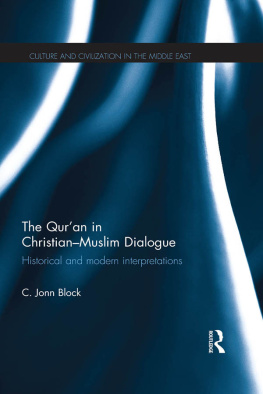Contents
Guide

Jutta B. Sperber
Anthropological Aspects in the Christian-Muslim Dialogues of the Vatican
Judaism, Christianity, and
Islam Tension, Transmission,
Transformation

Edited by Patrice Brodeur, Alexandra Cuffel, Assaad Elias Kattan, and Georges Tamer
Volume 14
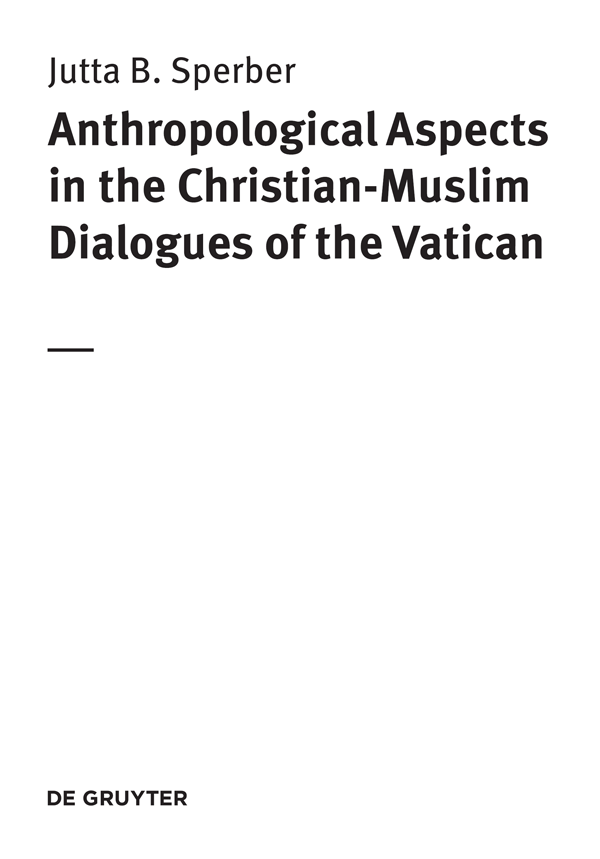
ISBN 978-3-11-058967-2
e-ISBN (PDF) 978-3-11-059091-3
e-ISBN (EPUB) 978-3-11-058973-3
ISSN 2196-405X
Library of Congress Control Number: 2019932234
Bibliographic information published by the Deutsche Nationalbibliothek
The Deutsche Nationalbibliothek lists this publication in the Deutsche Nationalbibliografie; detailed bibliographic data are available on the Internet at http://dnb.dnb.de.
2019 Walter de Gruyter GmbH, Berlin/Boston
Published in German as Die anthropologischen Aspekte in den christlich-muslimischen Dialogen des Vatikan 2018 Vandenhoeck & Ruprecht, Gttingen.
www.degruyter.com
Acknowledgements
Its all done and the English edition is within reach! I still remember the casual way in which Dr. Andrea Pacini, who was then my direct contact with the Fondazione Giovanni Agnelli in Turin, said, We shall help you with this project. Just draw up a list of what it will cost and then well see where we go. And of course you must include a calculation of the price for an English translation. I believe that neither he nor those who were standing invisibly but could be clearly sensed behind him and certainly not I myself had any idea how long and stony and also often complicated the path before us would be. Now we can all only breathe a deep sigh of relief and say, Thank God that we have now finally got there. But, since support is always needed for good and important ideas, like that of Father Maurice Borrmans M.Afr., that, after the Christian-Muslim dialogues of the World Council of Churches, I should also produce a book on the dialogues of the Vatican, an idea with which his fellow brother, H.E. Archbishop Michael Louis Fitzgerald, who was then the President of the Papal Council for Interreligious Dialogue, also concurred without much hesitation, in retrospect that was outwardly the decisive step. Maurice Borrmans support opened doors for me in Rome and also to the Fondazione Piero Rossano in Vezza dAlba and to the archives of the World Council of Churches in Geneva. The support from Andrea Pacini and the Fondazione Giovanni Agnelli also led my regional church, the Evangelical Lutheran Church in Bavaria, to back the project with a habilitation scholarship and the requisite leave of absence and again, at the end, with a contribution to the translation costs. All of this amounts to a proud sum of money and time from that source alone, coupled with patience as well, the justification for which can perhaps only be grasped in its profundity by someone who has not only written a second encyclopaedic work twice the size for submission to a German university, but also taken on the burden of seeing to a second English translation so that the subject matter can enjoy the international attention which it deserves. In this connection, my special thanks go to Dr. Dorothea Greiner, initially the head of personnel in the Bavarian Church and later my regional bishop in Bayreuth, who has given me great and personal support to this very day. I can only voice the hope that not only this book but also its further repercussions will prove her and all my other benefactors right.
These benefactors include, not least, the German Catholic Bishops Conference. Although it was not able to grant a scholarship to a Protestant pastor doing research on a Vatican subject, it has covered the lions share of the translation costs. The Harms Foundation also contributed to my living expenses during the intensive efforts at the beginning of my research, thanks to the intermediary of Prof. Dr. Klaus Hock of the University of Rostock who supervised this undertaking as a habilitation thesis with both persistence and patience. Prof. Dr. Perry Schmidt-Leukel of the University of Mnster generously included me in the Excellence Cluster Religion and Politics where I was able to complete my work and, in the process, received a number of different suggestions from that wide circle of colleagues. And, finally, I also believe that the German Society for Mission Studies will bear a share of the expenditure which the de Gruyter publishing house will incur with this publication in English. But what could money alone achieve without the work and cooperation of my two translators, Margaret A. Pater who had already translated my doctoral thesis into English and Neville Williamson who assisted her with the final section of this mammoth enterprise? Infinite thanks to both of them for their work.
An enterprise like this naturally depends not only on professional support but also on personal encouragement, and here there may be overlap as there certainly was in my case. Family and friends have to share the burden of such an undertaking if it is to have a chance of success and, on the other hand, colleagues in the field become personal friends. The best way of thanking them all is to celebrate with them as I was already able to do to some extent on the occasion of the habilitation ceremony at the University of Rostock and still hope to do with others later. So here I merely wish to mention those who, to my great regret, are no longer able to celebrate with me. They include, first and foremost, Father Maurice Borrmans himself. Without him this book would never have come about. I was profoundly grieved when I learnt that he would never be able to hold it in his hands. I should also have wished to give a copy to Monsignor Dr. Johannes Paffhausen of the berwasser Church in Mnster in whose residence I was allowed to live for a year. As someone who had worked for many years under Pope John Paul II in the Vatican Secretariat of State, he was an excellent interlocutor with whom I could discuss questions and impressions about my research work in a most uncomplicated way.
In addition to these theological companions along the way, three other persons are now no longer at my side who were close family members or whom I count as such in the case of Italy. The first who had to leave me was my mother and the next my motherly friend Barbara von Ihne in Arcore. How much both of them, each in her own way without ever having met one another personally, were concerned for me and my welfare, in view of what I had taken upon myself with this project, is something I am only now realising bit by bit as I look back, as well as the extent of the support which Ernst-Christoph von Ihne has given and offered to me over the past ten or more years. For the former I should like to express my heartfelt thanks to him and for the latter I can unfortunately no longer say Yes, thank you since January 17th this year. So relief, gratitude and joy are mixed with sadness and regret, but may gratitude and joy gain the upper hand with a view to the future and, not least, the motto of the family which he bequeathed to me: nulla dies sine linea.
Tremestieri Etneo/Catania,
St. Valentines Day 2019
Dr.theol.habil. Jutta Sperber
Introduction
1 Preliminary Remarks
This study has a significant pre-history. Almost as soon as my dissertation Christians and Muslims. The Dialogue Activities of the World Council of Churches and their Theological Foundation appeared, which reviewed the subjects of the Christian-Muslim dialogue of the World Council of Churches from its beginnings to the early 1990s, and also described the theological debates about the bases for interreligious dialogue in general, I received a noteworthy letter from Rome from Father Maurice Borrmans, responsible at that time for the periodical Islamochristiana. He wrote that German girl should now come to Rome to undertake a similar treatment of the Christian-Muslim dialogues of the Vatican as well. It was a very spontaneous letter; later on, he could not say exactly what had led him to write like that. As far as I was concerned, although I had sworn to myself three months earlier that I should never again get involved in battling with so much material of this kind, I was immediately enchanted by the idea. The implementation took a long time, however, because it was more difficult to finance a Protestant than to entrust the material to her. So I was only able to begin the research work quite a number of years later, supported initially by my own Bavarian Protestant Church which granted me a scholarship to work on a habilitation thesis for this purpose.

